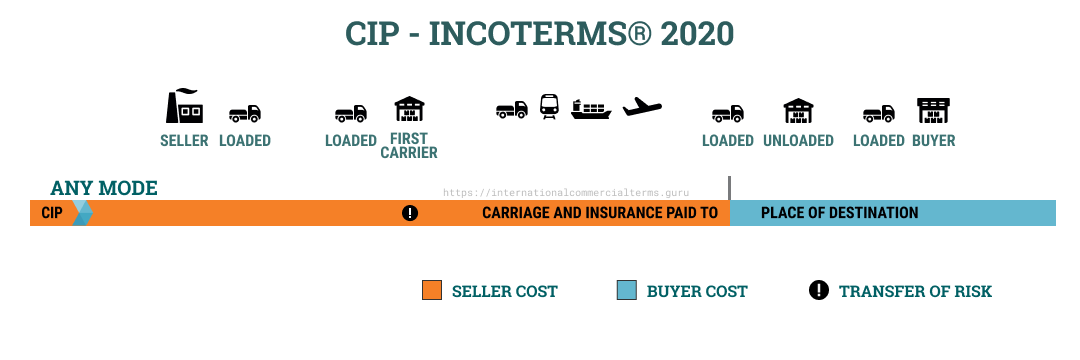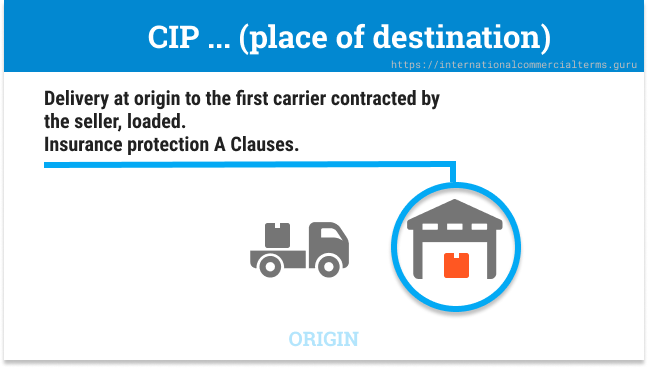CIP – Carriage and Insurance paid to (Place of Destination) - Incoterms 2020 ¶
Explained¶
Under CIP terms, the seller clears the goods for export and is responsible for delivering the goods to the carrier nominated by the seller. The seller must pay the cost of carriage, but the seller risk ends at the place of shipment. The seller must procure the minimum insurance until the named place of destination. The buyer has the option to contract additional insurance.
The risk is passed when the goods are received by the first carrier. This term can be used for any mode of transportation.

Doing Business¶
Seller pays transportation and insurance to the destination. Seller pays for extensive insurance which is often acceptable for bulk cargo, but not for manufactured goods or high-value merchandise. Extensive insurance is understood as “all-risk”. The seller obtains insurance for the buyer own risk. Delivery happens at the origin with the first carrier, this means that delivery happens at origin and the seller pays for freight until the final destination. Seller arranges export clearance and can be used for any mode of transportation.
In the case of claims, the buyer can claim directly with the insurance company. For CIP and CPT, place at the destination can be different locations like warehouses or truck terminals. Freight doesn’t have the same cost when delivered at the port or at a destination warehouse, additional inland and terminal handling charges will apply. The buyer is responsible for customs clearance. In practice, delays caused at origin which incurs in additional expenses are usually a topic of discussion between buyer and seller.

Examples¶
Mobile phones from Taiwan to Australia:
CIP Keilor Park warehouse of Mobile Distributors, Melbourne, Australia - Incoterms® 2020
In this scenario, mobile phones will be shipped by air from Taiwan to Melbourne Airport, after customs clearance, a destination forwarder nominated by the seller will transport goods until Mobile Distributor’s warehouse. Destination terminal handling charges at airport and transfer fees at destination airport are under the account of the seller. Seller arranges insurance. The buyer pays for customs clearance and duties.
Seller and Buyer obligations¶
| THE SELLER’S OBLIGATIONS | THE BUYER’S OBLIGATIONS |
|---|---|
| 1. General The seller must deliver the goods, commercial invoice, and any evidence of conformity. |
1. General The buyer must pay the price of goods as agreed. |
| 2. Delivery Deliver the goods to the carrier on the agreed date or period. |
2. Taking Delivery The buyer takes the goods from the carrier at the place of destination or at the point. |
| 3. Risks All risk of loss/damage until goods have been delivered. |
3. Risks All risk of loss/damage from the time or end of the period agreed for delivery. If the buyer fails to give notice of the place of destination, the risk is under the buyer. |
| 4. Carriage Contract carriage of goods until the place of destination. |
4. Carriage No obligation to contract a carrier. |
| 5. Insurance Insure the goods at maximum. |
5. Insurance No obligation to insure the goods. |
| 6. Delivery/transport document Provide the usual transport document and dated within the agreed shipment period. Full set of originals if the document is negotiable. |
6. Delivery/transport document Accepts the proof of delivery |
| 7. Export/Import clearance All export clearance expenses (license, security, inspection, etc). Assist with import clearance |
7. Export/Import clearance Assist with export clearance. Pay for import clearance and formalities (licenses, security, official documentation). |
| 8. Checking The seller must check, count, weight, mark, and package goods |
8. Checking No obligation. |
| 9. Allocation of cost Pay all the cost until delivery. Transport and loading. Unloading under the contract of carriage. Transit costs. Cost of proof of delivery. Insurance. Duties and taxes for export. All costs related to providing assistance in obtaining documents to the buyer |
9. Allocation of cost Pay from the time goods delivered. Transit cost not under sellers account. Unloading cost not related to the contract of carriage. Additional insurance not under the seller account. All costs for assistance. Pay duties and taxes for imports. Any additional cost if does not notify the shipment date or period. |
| 10. Notices Give notice that goods have been delivered. |
10. Notices Time or period for dispatching the goods and name the point of receiving the goods. |